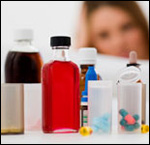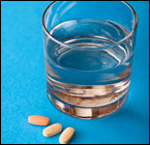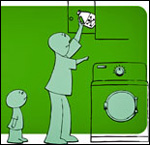Stay Safe during Poison Prevention Week
 In 2005, 65 people died every day from unintentional poisoning – and the numbers of deaths has been increasing. Learn how to reduce your— or a loved one's— risk.
In 2005, 65 people died every day from unintentional poisoning – and the numbers of deaths has been increasing. Learn how to reduce your— or a loved one's— risk.
The Poison Prevention Week Council has designated March 15-21, 2009 as Poison Prevention Week. This observance is focused on raising awareness about unintentional poisoning—a serious and often unrecognized problem.
In 2005, 65 people died every day from unintentional poisoning – and the numbers of deaths has been increasing. Learn how to reduce your—or a loved one's—risk and possibly save a life.
What You Should Know
 In 2005, a total of 23,618 people in the United States died from unintentional poisoning.
In 2005, a total of 23,618 people in the United States died from unintentional poisoning.- In 2006, 1,900 people a day— a total of 703,700— were seen in emergency departments after a poisoning incident.
- Unintentional poisoning deaths are on the rise. Poisoning death rates in the United States increased by 62.5% from 1999 to 2004.
- 95% of poisoning deaths are a result of drug poisoning—and more than half of them are due to prescription drugs.
- Poisoning is not just a childhood problem; it is affecting adolescents and adults in increasing numbers. Almost 3 out of 5 (59.6%) of poisoning deaths in 2004 were among men and women ages 35-54.
What You Can Do
To keep you and others safe from unintentional poisoning:
 Follow directions on labels when you give or take medicines. Some medicines cannot be taken safely with other medications or with alcohol.
Follow directions on labels when you give or take medicines. Some medicines cannot be taken safely with other medications or with alcohol.- Keep medicines in their original bottles or containers.
- Never share or sell your prescription drugs to others, including family members.
- Keep any pain medications, such as methadone, hydrocodone, and oxycodone, in a safe place only reachable by people for whom use is prescribed.
- Monitor the use of medicines prescribed for children and teenagers, such as medicines for attention deficit disorder, or ADD.
- To avoid drug interactions, check with your doctor if you are taking more than one prescription medication at a time
- Follow federal guidelines for disposal of unused, unneeded, or expired prescription drugs.
To protect children from poisoning: 
- Keep medicines and toxic products, such as cleaning solutions, in locked or childproof cabinets.
- Put the nationwide poison control center phone number, 1-800-222-1222, on or near every telephone in your home. You should also program it into your cellular phone. Call poison control if you think a child has been poisoned and if they are awake and alert. Call 911 if you have a poison emergency and your child has collapsed or is not breathing.
- Follow label directions and read all warnings when giving medicines to children.
Where You Can Learn More
Web-based Resources
Poisoning in the United States
Overview of poisoning in the United States, including occurrence, costs and risk factors.
Poison prevention tips
Tips for keeping you, your family and your friends safe from poisonings.
Protect the Ones You Love: Child Injuries Are Preventable
Resources for parents— including fact sheets, podcasts, and e-cards— offer tips on protecting children from poisoning, as well as other leading causes of child injury.
Medicine safety: Who's at risk and what you can do
Information on medication safety and how to properly take, monitor, and store medicines.
Cold and cough medicines: Information for parents
Information on cough and cold medicines and children.
Poisoning and methadone-related deaths
Overview of methadone-related poisoning deaths, including trends and state-specific data.
Poison Prevention Month 2009
Resources related to Poison Prevention Month 2009.
National Safety Month ![]()
Monthly campaign materials, including safety tips on poisoning and other injury topics and posters and other materials for you to use to raise awareness and make a difference.
CDC Podcasts 
Protecting Yourself and Your Family Against Poisonings (![]() 2:59 mins)
2:59 mins)
Poisoning prevention tips for audiences of all ages.
Unintentional Poisoning Deaths (![]() 6:12 mins)
6:12 mins)
Summary of a recent study on unintentional poisoning deaths, which indicated that poisoning death rates in the United States increased by 62.5% from 1999–2004.
Protect the Ones You Love from Poisoning (![]() 2:34 mins)
2:34 mins)
This podcast, developed as part of the Protect the Ones You Love initiative, discusses steps parents can take to help protect their children from poisoning, one of the leading causes of child injury.
Cough and Cold Medications for Children (English) (![]() 2:29 mins)
2:29 mins)
This podcast discusses the safety concerns of cough and cold medications and children.
Cough and Cold Medications for Children (Spanish) (![]() 1:48 mins)
1:48 mins)
Este podcast habla sobre las preocupaciones de salud relacionadas con el consumo de medicamentos para la tos y el resfriado en los niños, sin la supervisión de los padres.
All Unintentional Injury Podcasts
CDC eCards
Send a Health-e-Card on Preventing Poisoning
Current Features
Need info on a
different topic? See



